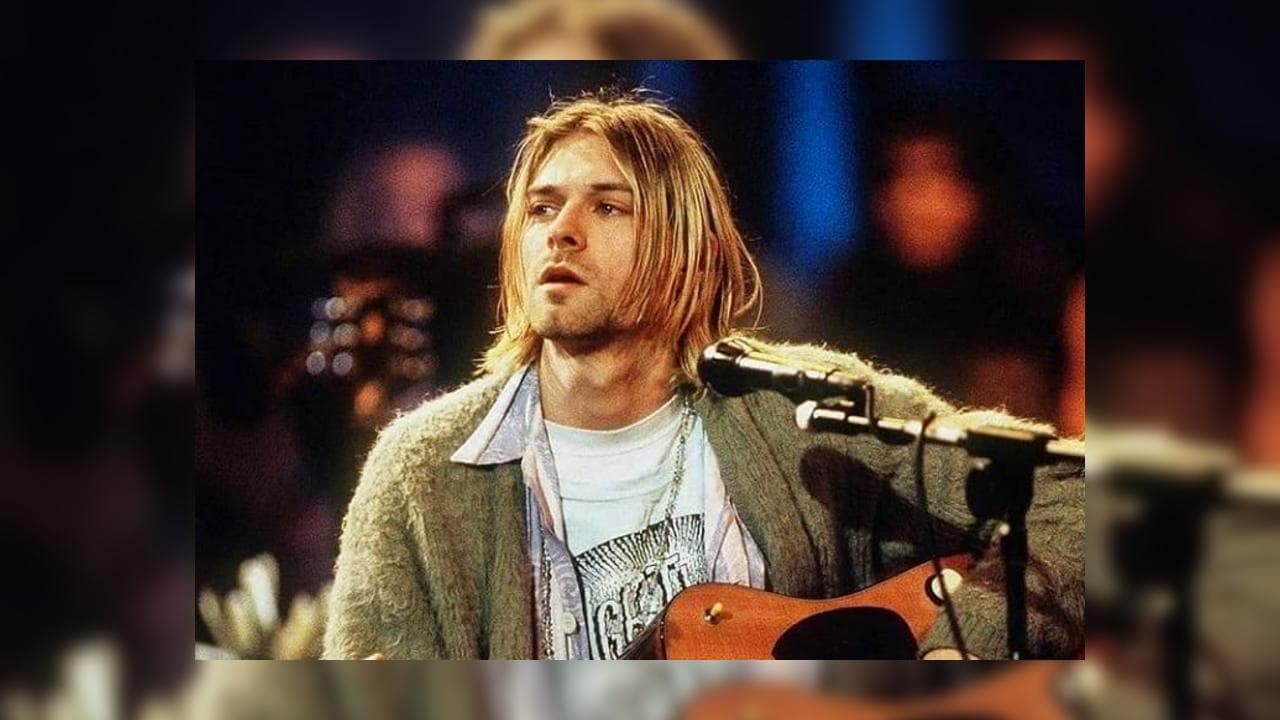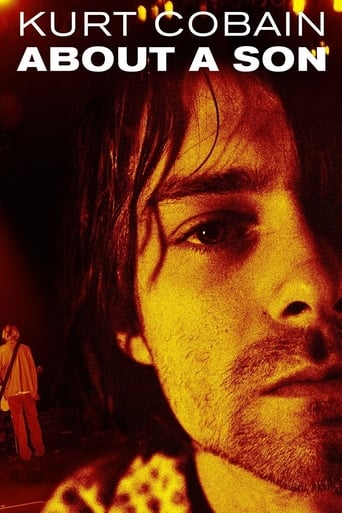Protraph
Lack of good storyline.
Huievest
Instead, you get a movie that's enjoyable enough, but leaves you feeling like it could have been much, much more.
Derry Herrera
Not sure how, but this is easily one of the best movies all summer. Multiple levels of funny, never takes itself seriously, super colorful, and creative.
frankzappayay
This is the official story. I don't think many people realise that that a lot of the stuff written about Kurt and Nirvana was either sensationalised, or just completely made up. This story though is one of the very few true stories. It is based on Michael Azerrad's book, "Come As You Are", which was official and was made with the help of the band, and their friend's and families.This movie is made WITH the actual discussions of Kurt with Michael. So the entire movie is basically just Kurt talking, and the movie makers then just added pictures to what Kurt was talking about.Sometimes it's a photograph or a painting, but a lot of the time it is actual footage of the people and places in this story, and it makes it so much easier to visualise what Kurt is talking about, when it presented so well for you like that.If you have read the book, this is like a watered down version of that, but it is still worth a watch because you are hearing it from Kurt himself, and you are hearing the quotes in their original form. For the book, some of the quotes were taken apart and put in different stages in the story to make it fit together properly. So here it is in it's raw form which is interesting. And there are a few things that didn't make the book.I really liked the visual aspect though. Some said it should have just been an audio CD, well I completely disagree, (as do other people). The pictures visualise everything for you, so you get the full emotional experience. Your mind doesn't have to wander around, trying to think about what Kurt is saying. The pictures are already here for you, so it gives you time to think about what Kurt is actually saying. It also shows you a lot of things that are in the story. The actual places Kurt lived and hung out etc. Hearing him talking and seeing the footage of this stuff just seemed to fit together perfectly, and it surprises me that some people didn't appreciate that.Seeing Olympia, Aberdeen, and Montesano etc.. it helps show the story that is being told.Basically this gets two thumbs up from me. It's a must watch for a Nirvana / Kurt fan, and probably an interesting watch for people who aren't even fans.My only notes to you would be that it is pretty sad, and also it a VERY thinned out version of what you get from the book, so if you want more, you really should get the book too.
origin20
For a filmmaker who touts craft so much, he lacks it completely. He is great at self-promoting his film, but it is entirely empty. I have to agree with other commentaries on this film... it is wonderful to have the audio tapes of Cobain, but the film it a thin wrapping around this content. I wish Schnack would spend more time focusing upon his film-making than complaining about the state of documentary. One has to ask if it were not Cobain would this film get any notice. The answer is no. I found the camera work overwrought and trying. There is little to be said of the editing. As with too many docs, it could do with some aggressive trimming and could lose 1/3 of the film without any loss to the story.
M W
As kids pre Nevermind even Bleach my friends & I listened to a lot of demos & tapes from Seattle. The list of bands are numerous mostly The Melvins Green River & Soundgarden. We considered Nirvana the runts of the litter and didn't think they would ever make it beyond demos. At the time the word grunge wasn't something we used to describe this kind of metal rock crap we were listening to It was just druggie and hard sounding which fit our lifestyles more than Winger or Poison or even Metallica or Slayer. So when it all exploded it was very surreal kind of like being in a dark room that was suddenly flooded with light & crowded with people. Seattles little secret was no more. So that fact then was hard to digest for me & now some 16 years later as Van Sant & this doc further explore & dig into Cobains life I just think to myself Jesus he wasn't that interesting at all. Why are we still talking about this man as if he were this enigmatic figure who changed the world? Im not going to attack the man but heres where my head is at he left his daughter to be raised by Courtney Love. This is a large part of what makes this country so sick. Your worshiping a dead junkie not some anti-hero who died for his beliefs. This isn't about art or fashion & im not trying to be an a-hole but every time I see this woman benefit from this mans death or see another book another CD another movie I get very very sick to my stomach. Its disgusting & more importantly trivial. You want someone to look up to just take a look in the mirror.
Chris_Docker
Kurt Cobain, lead singer of Nirvana before his untimely death, is often credited by music experts as being one of the most influential musicians of his time. A claim that careful analysis demonstrates to have much credence. Yet he seemed an unremarkable individual. Physical and mental illness. Dropping out of high school. Habitual drug-user. Where did he find the insights that made him such an inspiration to other artists? Making a famous rock-star biopic must be a temptation to fill it with crowd-pleasing footage of their songs. Then link it with candid shots to show the 'real' person. Thankfully, Schnack has steered an alternative course with great integrity in his pursuit for truth. He has looked at how the formative years made the man. The result is not a pat answer underlined with some snappy lyrics. It is a convincing and inspiring portrait of a man who was not easy to know.Twenty five hours of unreleased interviews provide a voice-over for the film. We focus on the period from childhood to when Nirvana attain recognition. These formative years, together with Cobain's own words, give us a feeling for how his music developed. More importantly, they show the pressures on his character. In almost a crucible of personal hell (in spite of the bravado in what he says), Kurt Cobain forged a telling sincerity of expression. That expression of someone who has little choice.Cobain acknowledges many influences, including Led Zepplin, Kiss, AC/DC and the Cars, as well as more obscure bands. But his key experiment was based on mixing seemingly irreconcilable genres. "How successful do you think a band could be if they mixed really heavy Black Sabbath with the Beatles?" he asks.Some bands had approached elements of this already. Zepplin used strident contrasting sections: gentle harmonies would alternate with heavy metal sections. Nirvana invoked not just musical contrasts but extreme disparities of mood and lyrics. Many of their songs flip in a split second from gentle, sensitive, caring sing-along-with-your-mum words - to an extreme violence of sound and imagery. "Come as you are, as a friend," takes on a horrific edge in subsequent verses. The shock value has been duplicated since (usually in a less extreme way) in the structure of music and lyrics by many rock bands, and even seems to filter down to pop groups such as Rihanna and Morningwood.We could equally wonder if it was just part of a general music drift. But the film's insights help even an untrained ear to analyse the trends and Nirvana's role in them.Cobain's life gave him plenty to draw on. Isolated, homeless (in the middle of winter), suffering from ADD and later manic-depression, in his dark night of the soul we can see that his love of music was his only interest. Living in a backwater of Seattle, the only possessions he valued were his artistic nature and the guitar that offered a possibility of expression.There is nothing manufactured about the sound of Nirvana. Its heartfelt honesty perhaps helped to propel the group to wider audiences at a time when indie bands were being methodically sidelined by an avaricious industry. In reaching a wider public, Nirvana also helped to show it was still possible for an unknown band to break through the seemingly invincible wall that dictated what was acceptable.The film's cinematography, still and moving images of the places and sorts of people that populated Cobain's early life, cleverly and almost imperceptibly adds flesh to the raw bones. The bleak Aberdeen backwater. Sleeping under bridges. Spending time in libraries to keep warm. Eventually meeting middle-class youngsters who populate an unsettlingly different world. All through this, the idea for him of simply making enough money to survive was "awesome." Cobain is maybe an extreme example of the double-edged angst felt by many young people. "I was such a nihilistic jerk half the time," he says. "I'm so f*cking sarcastic at times then at other times I'm so vulnerable and so sincere, and that's pretty much how every song comes out - it's a mixture of both of them and that's pretty much how most people my age are – they're sarcastic one minute then caring the next." Since the nihilism pervades all of the interviews except where he speaks of music, it is reasonable to believe, against his claims, that he didn't change much. "I'm p*ssed off about everything in general and so all these songs are pretty much about my battle with things that p*ss me off."The words are inelegant and he (technically) contradicts himself on occasion. But the general sense comes through. It is one of the special gifts of cinema to be able to show the bigger picture by putting words in different settings, juxtaposing them with images, to give meanings that could otherwise be missed.Perhaps Cobain is at his most articulate when talking about privacy and the intrusion of the paparazzi. If people believe they have a 'right' to know everything about a celebrity's life, "Then I have a right to try and change that view," he says.Cobain was a tragic character who found happiness in so little and yet affected his artistic field greatly. Schnack's portrait will not satisfy fans that want a pop video of Nirvana songs. It doesn't feature a single one (even though it will increase subsequent enjoyment and appreciation of their music.) Neither will it satisfy the gore-hounds who want to endlessly debate whether his death was suicide or not. Yet somewhere in the misery of Cobain's life was born a spark of creative fire that was far more important. It is hard to imagine how this film could have been less commercial or more true to the quest for that flame.

